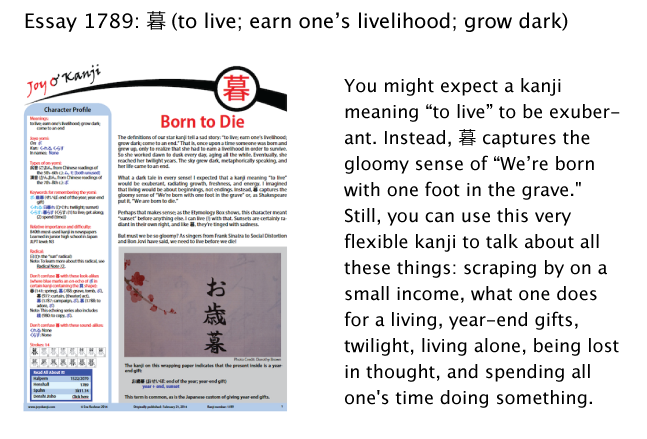If It Takes All Day
Today I present Part 1 of a three-part quiz. I didn't create this challenge; rather, proofreader Ryoichi Chida brought it to my attention. The questions come from a difficult quiz called ТЌЦУЃйуаћ (сЂФсЂАсЂ«сЂєсЂЉсѓЊ) that 12-year-olds in Japan can take.
Here are three clues:
A. сђїсЃбсЃбсђЇ
B. СИђТюЮСИђтцЋ
C. тЁЅжЎ░уЪбсЂ«сЂћсЂесЂЌ
Figure out what each one means, and think of a two-kanji word that ties them together thematically. Locate that word in the following grid:

I'll present the answers at the end.
In the meantime, let me distract you. Last weekend I saw the newest movie from director Hirokazu Kore-eda, Like Father, Like Son. It's about two boys switched at birth and the way it affects their families to learn about the swap six years later. I found the story provocative and moving, though it was missing a little something that I couldn't quite identify. Anyway, my biggest kanji takeaway involved a sign on an exterior wall:
ухѓТЌЦудЂуЁЎ
I puzzled over it. Because I glanced at the удЂ, which is part of удЂТГб (сЂЇсѓЊсЂЌ: prohibition), I knew they were outlawing something, but what? The end (ухѓ) of days (ТЌЦ)?!
The sign disappeared before I could notice the final kanji, уЁЎ (сЂЉсѓђсѓі: smoke). If I had, I would have realized right away that it meant "No Smoking." Strikingly, the sign doesn't mention the act of smoking or anything about tobacco. The last two characters simply prohibit smoke itself.
And what of the first two? Here's what the dictionary has to say about that:
ухѓТЌЦ (сЂЌсѓЁсЂєсЂўсЂц: all day; for a whole day)
Oh, I see. This means "until the day ends." Indeed, ухѓТЌЦудЂуЁЎ (сЂЌсѓЁсЂєсЂўсЂцсЂЇсѓЊсЂѕсѓЊ) means "No Smoking at Any Time."
As long as we're talking about the end of the day, I'd like to announce the publication of essay 1789 on Тџ« (to live; earn one’s livelihood; grow dark; come to an end). Because this kanji can mean "to come to an end," it plays a part in many words about the end of the day, including this one:
ТЌЦТџ«сѓї (сЂ▓сЂљсѓї: twilight; sunset) sun + setting
The Тџ« kanji also pops up in terms about the stretch from daybreak to sunset, such as this example:
ТўјсЂЉТџ«сѓїсѓІ (сЂѓсЂЉсЂЈсѓїсѓІ: to do nothing but; spend all one’s time doing)
daybreak; to begin + nightfall; to end
For instance, this word applies if someone does nothing but smoke all day, maybe even standing right under that No Smoking sign in an act of rebellious irony.
Here's a sneak preview of the essay:

Okay, here are the answers to the quiz:
A. сђїсЃбсЃбсђЇ(ТАЃ) means "peach," and the quotation marks indicate that you're supposed to associate this word with the following proverb:
ТАЃТаЌСИЅт╣┤ТЪ┐тЁФт╣┤
Peach trees and chestnut trees take three years to bear fruit, and persimmons take eight.
ТаЌ (сЂЈсѓі: chestnut); СИЅт╣┤ (сЂЋсѓЊсЂГсѓЊ: three years); ТЪ┐ (сЂІсЂЇ: persimmon); тЁФт╣┤ (сЂ»сЂАсЂГсѓЊ: eight years)
That's the literal translation. Figuratively, this proverb means “It takes time for one’s actions to bear fruit." I'll say! I've been studying Japanese for donkey's years, and I've never heard that proverb, so there's no way I could have derived such a thing from сЃбсЃб, quotation marks or no quotation marks!
The good news is that that's the hardest question out of all three parts of the test.
B. СИђТюЮСИђтцЋ (сЂёсЂБсЂАсѓЄсЂєсЂёсЂБсЂЏсЂЇ: in a day; in a brief space of time) 1 + morning + 1 + evening
Oh, we're back to morning-to-evening windows of time! And looking up СИђтцЋ in Breen leads me to this fun word:
СИђтцЋУЕ▒ (сЂёсЂБсЂЏсЂЇсѓЈ: short story; short-story writer) 1 + evening + story
Apparently, a short story is one that somebody can crank out in an evening!
C. тЁЅжЎ░уЪбсЂ«сЂћсЂесЂЌ (сЂЊсЂєсЂёсѓЊсѓёсЂ«сЂћсЂесЂЌ: time flies like an arrow; time and tide wait for no one; life is short) time (1st 2 kanji) + arrow
The сЂћсЂесЂЌ means "like."
The theme tying these three terms together? Time! The word to find in the grid is ТЎѓжќЊ (сЂўсЂІсѓЊ: time).
Speaking of time, we all know that with kanji study, it takes quite a bit of time (i.e., longer than donkey's years) before all the effort bears fruit. For some reason, three bloggers have recently addressed the issue of how best to learn kanji. First, Professor Victor Mair wrote a blog suggesting that it might be more effective not to start learning kanji as early as we do. Lots of people chimed in, so the comments section is lengthy. Another blogger then wrote about Mair's column, eliciting more comments from followers. Coincidentally, Tofugu recently did a survey of popular kanji-learning techniques.
No one mentioned the Joy o' Kanji method (or joy at all, as far as I could see), so my feathers were a bit ruffled. Why do people assume that kanji learning is a bitter pill that must be forced down one's throat? I was too annoyed to engage deeply, but I'm sharing the links with you in case your feathers respond differently!
Have a great weekend!

Comments